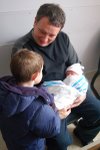On the last day of the old year I burnt my hand and had a flat tire. It seemed a fitting end to a year in which sickness had touched every single member of my immediate and much of my extended family. In my New Year's prayer it seemed unbelievable, a disease for each member: mono, skin cancer, ulcerative colitis and pericarditis, difficult pregnancy, depression, arthritis, alzheimer's, benign tumour, rectal bleeding. I could go on. Suffice it to say, the family, grouped in solemnity over this list of woes, collapsed into laughter. Mash humour. The release of pent up anxiety after the worst is presumed over.
In the light of the Tsunami, everything else seems absolutely trivial. Now, nearly two weeks after that tragedy, the world still reels and rocks itself, mourning the innocent loss of life, the enormity of death, dislocation and destruction. It seems this event will not leave the front pages soon. It puts suicide bombers in their place. It stops us in our trail of consumption and causes us to open our wallets and hearts.
In the aftermath of the Tsunami, we examine our beliefs. The problem of pain as a serious theological issue raises its head yet again. We ponder the notion of a good God in the light of catastrophe...not manmade, this time, but arising from the depths of the sea, part of God's creation.
In the lesson of the Tsunami, we are caused to consider the God who became flesh and dwelt among us, who suffered and was tempted in all ways as we are, who spent his life amongst the sick, the poor and the dying, and who died a painful, seemingly unnecessary death by torture. That Christmas word, Immanuel, God with us, gains significance. And the name Jesus, God is salvation, adds a layer of meaning. God saves by participating in our humanness and pain.
The burns on my hand are beginning to crust over, a sign of health and survival. I can type this without pain. These are wounds not worth mentioning in the light of the Tsunami. Then again, they are like a token to remind me to pray for wounded ones everywhere...for those caught up in earthly forces beyond their control, for those deluded by dogma into sacrificing life for ironclad prinicples, for those whose wealth pretends to cloak them from trauma, for those whose poverty exposes them to more than their fair share, for those who sensitive hearts leave them open to wounding by word as well as deed.
My fleshly wound reminds me I am not invincible. I share the human condition. I am wounded and I wound. In particular, I can wound by ill considered and hasty remarks, lack of sensitivity to my family, ill temper. For these pains, I repent and ask pardon and go on, praying to do better in the New Year. In the light of the Tsunami, this is the very least which I can do.
Subscribe to:
Post Comments (Atom)





3 comments:
hope you and yours have a much healthier 2005 connie! sorry about the burn! this tragedy has left many of us 'off axis' as lisa mentioned. feeling the pain of those we've never known in a deep, deep way. using that to remind myself not to wound others is a profound step to paying tribute to those other's suffering - thank you!
This was a great post. I have also found it extremely difficult to articulate the meaning of this recent tragedy, and all that comes to mind is the idea of 'suffering presence': that god, despite god's transcedence, is somehow submerged in the suffering of humanity. I believe that in this god is present and in solidarity with not only these victims but all victims everywhere. Thank you for your words.
Connie as I read this I think about leprosy. I am not sure that it is appropriate to think of that but it is your conversations about pain, feeling pain, knowing pain. Without the ability to feel pain, we are desensatised. The pain of this tragedy is one I can only minutely imagine and yet I want my heart to never lose the ability to be sensative to the pain of humanity whether near or far from where I stand. I don't want my heart to have a type of leprosy that means I am unable to feel the pain.
Post a Comment